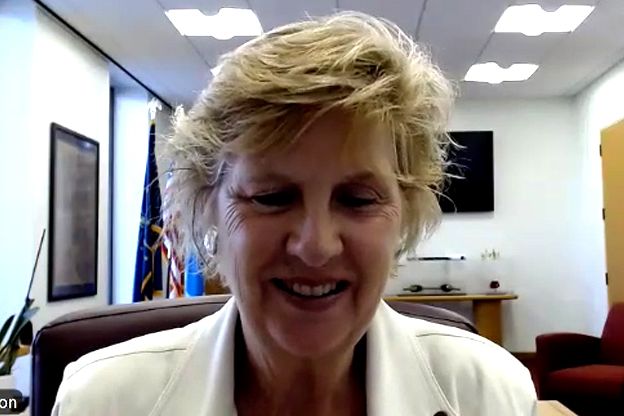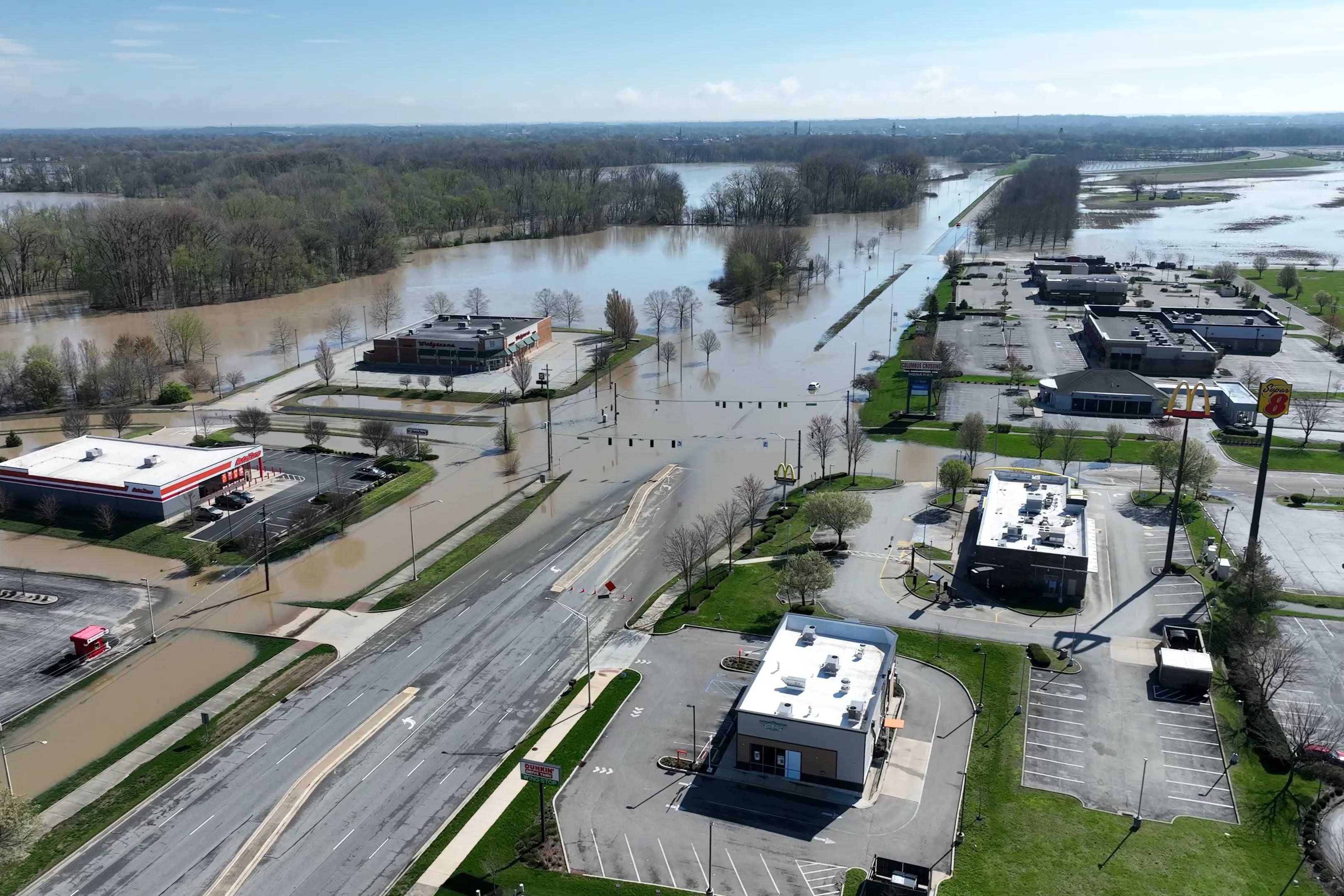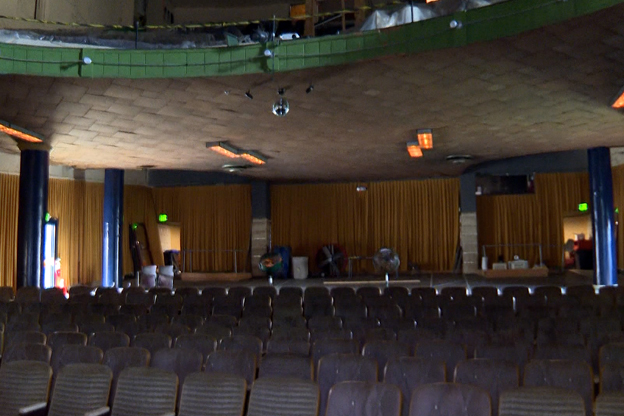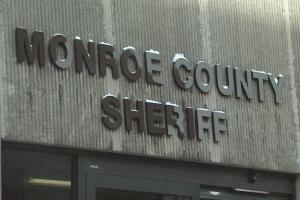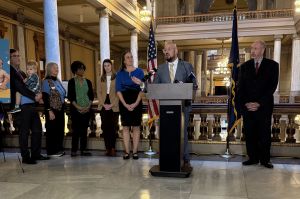Joe Hren
Hello and welcome to ask the mayor on WFIU. I'm Joe Hren. We're with Columbus with Mayor Mary Ferdon, who's at City Hall. I'm on Zoom today due to scheduling issues over here on my part. So really, and I know you have a busy day today too. So thank you so much for having us. How's, how's Columbus today?
Mary Ferdon
Columbus is great today. Happy May today is what May 6, and it's, it's warming back up. It's beautiful outside. The sun is shining. This is kind of that entering that period of time when everything is beginning to bloom and and smell great. So, yeah, Happy Spring.
Joe Hren
Yeah, you know, speaking of weather, I know Governor Mike Braun has declared disaster areas due to that flooding severe weather a month ago. You know, what areas are still in need of help or clean up? I mean, how many residents are still looking for help?
Mary Ferdon
I can't answer that, but I know that the Small Business Administration or office. Office of Administration has been in town. I think they're collecting data sent through I believe it's May 16, and so really appreciate them being here. We've directed any residents or property owners who've had some issues to directly to them to get what help they can. So really appreciate Governor Braun making that determination.
Joe Hren
Yeah, something we- I'll link to a story we have on that too. I wanted to ask you too about, now that the governor has is signing bills giving some homeowners up to $300 relief from property taxes, but school, cities left with millions to make up. Some Bloomington officials, the mayor, county officials here saying that it leaves them no choice. They're going to have to raise local income taxes to make up the shortfall that they're getting from the state. Are you talking with other city and county officials, and what are the discussions?
Mary Ferdon
Yeah, I was actually at the mayor's Institute last week in Indianapolis, where there was, you know, I don't know, 60 plus mayors, and I think we're all on the same page, first of all, trying to figure out what the bill exactly means. And so we've got financial, you know, people helping us sit down and see, because there are so many changes to the various laws, not only to the property tax deductions that you can take in the credits to you noted, there's a new credit for, you know, disabled veterans. There's a new credit for for all homeowners, for homestead credit, one of the deductions is being eliminated over time. Another one is going to grow over time. So kind of working through what those numbers mean, it is going to have some impact on Columbus, hopefully not as great as we originally thought. So the legislators did kind of clean that up with as far as the local income tax, that doesn't take place until, it doesn't really change until 2028 so a community can't pass a local income tax until 2027, and there's a lot of changes in the law that need to be made before that. So in conversations that we've been having with state legislators, they, they have talked about cleaning some of the cleaning some of it up, tweaking it a little bit, once they see how the property taxes affect cities and towns and schools. We will lose money with the property tax changes that they've made, and so unfortunately, many communities will be will really be forced to pass LIT, which is Local Income Tax ordinances simply to be able to continue to provide services at the same level. And that's the key. Is really, as a community, what we have won't allow us to grow, and it'll just barely allow us to provide the services that the communities really the citizens ask for and that they want. And so, we've got to find that balance between growth right, which is really important, and then not overburdening the population. So we're watching it too. We'll have a better idea, probably over the next three to six months, what it means for the 2026 budget. So I think most communities are in the same boat, though. We're all affected a little bit differently, whether or not we're dependent upon business, personal property tax, if we're a community that's been able to grow, that's really the key. If your assessed value keeps going up because you're attracting businesses and homeowners. But for smaller communities that aren't growing, it's going to be really difficult to be able to maintain services. And I know I threw a lot at you, it's just, it's a very- property taxes are a very complicated process. And when you- it's like having a lot of pieces on a chessboard, when you move one, you affect the rest of them. And so it'll really take us a little while to see what, what, what, what's gonna, what's the final result.
Joe Hren
Yeah. And you know it's, I mean, of course, hearing the same theme with almost every mayor that we talked to on this show. And you know, we post some of this on our our Facebook page, and some of the responses are, oh, look. You know, they can't trim any budgets, but they can only add to their budgets. But I think the common theme that I'm hearing from every mayor is that you really can't trim without cutting services. It's not like there's a layer of, of what they call that, you know, fat sitting there, right?
Mary Ferdon
Yeah, and I understand that the perspective is there's always something that you can get rid of, and you, we probably can, but at some point in time, very quickly, it is going to get into services that people really enjoy. I know the city of Columbus runs very lean on staffing. We've worked hard over the 10 years I've worked here, I think going back in time and making sure that we we do as much as we can with this few, as few as people that we we can, but there are certain areas that you can't, right? Obviously, law enforcement is important. Streets are important. You know, if you want your trash picked up, right? You have to have people to do it. Now, we've been able to get around having more staff people by using technology, and that's something that I think all cities will will do is look at, how can we continue to use technology better? But guess what? That technology costs money, too, right? Software, apps, or equipment that's more automated, so you're going to be paying for it at some point in time. And I'm not here to tell you that we're going to immediately cut services. We're going to work on things that we do that maybe make life better for the community, but aren't have to haves, and then we'll really focus on making sure we can maintain the services that we have to have.
Joe Hren
I want to just get your quick take to, you know, again, news circulating about recent federal immigration enforcement activity. Do you know of what's going on in Columbus, but you know, knowing, of course, I have to preface saying that federal immigration enforcement, it falls outside of the city's legal authority, but I assume that maybe people, you might be one of the first people, people go to when something like this happens in a city.
Mary Ferdon
Right, and so it's a great question, and I understand where it's coming from, but to your point, the immigration part of law enforcement, falls fully on the federal government and local law enforcement, as I've been told by both the city, and I've read by the local sheriff's office, is that we have always, we've always worked well with the federal immigration officials, and so nothing has really changed there. It's not part of our purview. They have very different rules that they use, which are, we are police, and police don't use as far as, like, warrantless arrests and things of that nature, but anytime that we're asked to participate with, you know, federal law enforcement on anything, Columbus Police Department always has, and I that won't change, but we've not added any new procedures or process for the Columbus Police Department.
Joe Hren
The City of Columbus launching a new initiative aimed at increasing availability of low to moderate income, single-family housing within the community, I believe it's called PACT, Providing Affordable Construction and Transformation. Can you explain where did this come from and the goals?
Mary Ferdon
Sure, I'm very excited about this program. Actually, it came from many of our small local business investors and developers who sometimes feel left out because the big players in town, right? We're looking at them to build the 100 and, you know, the 100-unit housing, and so we're talking about 10s of millions of dollars, and they sometimes feel left out as far as getting incentives from the city. So what community development is, along with the City Council's help, we, we diverted about a half a million dollars that we had left in our dollars. And so we set up a program where we incentivize the small developers to go into some of our infill areas within the city where a larger developer wouldn't even be interested and build single family homes and then then sell them. Well, we're not looking for rentals at this point in time, and so we are incentivizing them through giving them money to do that. And I don't have the amounts in front of me. I think it's up to 40 or 50,000 we'll pay for demolition, we'll pay for permitting, and the goal is to reward somebody locally who's helping the community by providing housing that we desperately need, and then also getting some of that infill housing in areas where it really makes sense, because the older housing stock is in need to be torn down and removed. It's kind of a pilot, because we just started with a certain amount of money, but I met with a group of small investors a couple weeks ago, and, you know, basically told them, if this works and it works well for you, and if the city sees some again, by getting more housing, we will, we will find more more dollars to do this.
Joe Hren
And are there any, I guess you can't go in the city, can't go in and tear down a historic structure. So there, there must be some guidelines with that?
Mary Ferdon
Right, these are generally, they're either empty lots because there's been a fire, or there's, you know, the housing, like I said, the housing stock might be very old or have been abandoned, because we've really worked hard over the past decade to try to eliminate some of those abandoned buildings where they're basically just collapsing and they're an eyesore and they're also obviously a safety issue. So code enforcement has worked hard to do that, and oftentimes that property has sat there for a while, so we're missing having anything on the tax roll, and it's a perfect opportunity to put a single-family home, and again, be able to get another family in a home, get another house on the tax roll. So it's kind of a win-win situation, and we've got a lot of great developers here in in the community who that's, that's what they do well. So we're hoping that it works and that we can expand it.
Joe Hren
Well, and this must go kind of hand in hand with the city, and it was gathering a lot of input on the future of downtown, and housing is something that was so important too.
Mary Ferdon
Right, and as you know, last year, we completed a housing study which told us that we needed about 300 new units a year, from from today through, I think 2035, which is a lot of housing. So we needed, just across the board, across the spectrum from low income and workforce up to kind of higher income. We also need it in different areas, and then we need it different sizes. We need single family home. We need duplexes. We need tri and fourplexes. And I don't know if they keep calling them -plexes as if they get larger. We need, you know, multiple family homes as well as single and so in the downtown study that we're currently doing, we're hearing the same thing. We haven't gotten the final results, but we're hearing that that's loud and clear, is that our community needs more housing, not only in the downtown, but surrounding the downtown, and so which is where this PACT program we think will, will work best. So again, they, they are that's kind of an a coordinated effort to provide housing multiple family downtown, but also some single family too.
Joe Hren
You know, last time we we talked a month ago, the city was trying out the new DORA district, the Designated Outdoor Refreshment Area. I was there on a Tuesday, and it was happening on a Thursday afternoon. So just wondering now, how did it go? What did you learn?
Mary Ferdon
Yeah, I'm trying to think back that goes back in time a little bit, Joe. And I yeah, that particular event may have gotten rained out. I think we've used the DORA since, and it's worked really well. And we will definitely, we've definitely got scheduled with a number of festivals and events through the next couple months. So by the end of the summer, we should have some really good kind of metrics on do people like it? Does it encourage more residents and visitors to come downtown? Which, of course, is why a DORA was created to begin with. And you know, hopefully we'll have a lot of happy customers.
Joe Hren
Can we, do you have any update on the Crump Theatre? It's a historic downtown theater being renovated. Organizers launch is at Project Encore from the Heritage Fund. I don't know if that's really with anything to do with the city, but is that something that you can fill us in on?
Mary Ferdon
Yeah, I can just really kind of reiterate what you just said. So there's been a lot of interest in the work on the old Crump Theatre, which is actually has had a number of studies over the years, and a lot of interest in, can it be renovated. Can it be rebuilt? And so fairly recently, the local community foundation, Heritage Fund, helped fund a kind of a pilot called Encore, which, and the goal of Encore is to not only look at how it can be rehabbed, but look at how the comp can be programmed, right? Because that's the key is, like, you can, you can spend 10s of millions of dollars on an old theater, but if it can't be programmed well, somebody's got to sustain it. And so Encore is moving along. They've had a number they continue to have a lot of a number of events planned. I think they have- we'll be launching a fundraiser sometime later this summer to see how the community feels about, you know, rehabbing and making a viable performing arts space for Columbus. So lot of excitement around that.
Joe Hren
Yeah, I did a story on that. Was it last year or two years ago, and boy, what, what a gem to have there. But, boy, so much work to be done.
Mary Ferdon
A lot of work to be done. Yeah, and there's been a lot of lot of volunteers over the years have done a lot of work. But most recently, there's been some concerted effort to replace the seating and, and work on the lobby. And so they are beginning to have more events there. And, and you know, private rental as well as kind of some public events. So you'll be hearing more about that, I think later this summer. Okay, that ties into our downtown study, which we should have results from, also.
Joe Hren
I know you're working on some mental health initiatives too, when we talked about housing, May is Mental Health Month. What new things can you talk about with this?
Mary Ferdon
Right, so about three years ago, the city, along with Bartholomew County, our local Columbus Regional Health Hospital, United Way, our school systems and Centerstone, created an initiative called Mental Health Matters. And the focus was really on, how can we educate the community? How can we grow access to mental health, and how can we address the stigma that people have? Because, as you know, you know, we all have physical health, which we, many people like to talk, talk about more than we'd want to hear, but mental health, we all have mental health. And so that's often a stigma with that. And so the initiative has grown over the past couple of years, and we're kind of- it'll be transition next year. But May is Mental Health Awareness Month, and so we have just a large number of events going on that people can, can take, partake in, can get more information. We're really concerned, and I don't have the statistics in front of me about the mental health issues that we see in our kids, and I think that grew since COVID. And so we've really been trying to get more access to for school kids and for their caretakers, and help parents understand what the, you know, the signs that they need to be looking for. Because you know, as you know, oftentimes, mental illnesses can, can start very young. But we found - I shouldn't say we found - but you know, information shows that if a child shows has an expression of mental illness, if you can get treatment quickly, then it can it can be diagnosed, it can be dealt with. What happens is, if it's not dealt with, then it, you know, it becomes worse over time. So yeah, we're really focusing on mental health year round, but in May, we're trying to hit it hard. And if you go to the Columbus city website, you'll see a link to the Mental Health Matters website. And we really just again, we want to talk about it well. We want people to understand that most of us in our lifetime will either, you know, maybe have some mental illness ourselves, or, you know, just even if it's temporary, with postpartum depression after having a baby, but oftentimes we'll have a family member or a friend who deals with it. And just understanding what it is and that there are places you can get help, and that it's not something that you, it's something that you talk about, and you try to get people help. So thanks for asking about it. I think it's really important that we talk about it.
Joe Hren
Yeah, absolutely. And we're about a minute left. Always like to leave that to you. I know what, the Farmers Market opens again? What else is going on?
Mary Ferdon
Yeah, this Saturday farmers market, May 10. It's on Second Street here in Columbus. If you come in from the South side of town and Second Street and turn on to Washington, it's right behind the Columbus City Hall. It seems to get bigger every year. People love it. It's very it's kind of in a very natural setting, lots of trees and wooded area. We've got lots of parking. I think the last time I talked with our Parks and Rec. Department, the vendor list was full. We have a lot of great bakeries. Have a lot of always a lot of great flowers in the spring. And if I remember correctly, is it, is Sunday, Mother's Day? Yeah, so it's a great time to come down and get your get your mom some mothers, or get your mom some mothers. Sorry, get your mom some flowers.
Joe Hren
Or, or goodie or two. Well, thank you so much. Appreciate you being on the show. And boy, it's, it's summer, you're right. It's summertime. We'll see you in June, huh?
Mary Ferdon
That's right. Thanks, Joe.







